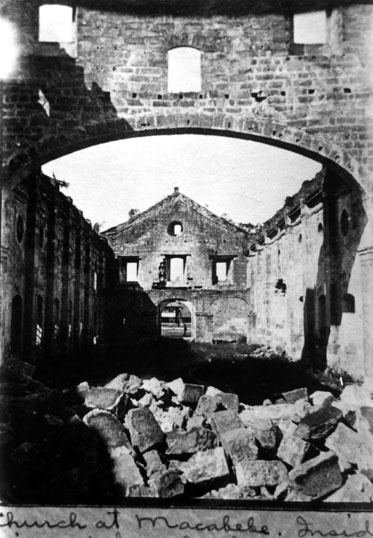May 1899: A civil war within the Philippine-American War
May 1, 1899, marked the first anniversary of Admiral George Dewey’s lopsided victory over the Spanish fleet in Manila Bay. Ironically, the atmosphere in Manila and in the provinces was extremely subdued. Obviously, there was a war ragging north and south of Manila. However, both parties in the conflict had benefitted from Dewey’s victory. May 1, 1899, was just another day in the bloody Philippine-American War.
On May 1, 1899, the weather had become rainy in the evening. By morning on May 2, the sun was bright and hot. The extreme heat returned on May 3. One American soldier said that it was “as hot as ever.” The weather was affecting the ranks of the American troops. Many of them were hospitalized in Manila. Some of them were sent to a hospital on Corregidor Island because the bay breeze was considered healthy.

Macabebe Church. Photo from the Filipino Heritage Library
The Americans continued to gain territory in both the south and north of Manila. In the south, the United States Navy used large cannons to pound revolutionary positions. The navy also used smaller gunboats to patrol rivers and inlets. The Americans were incurring a high rate of casualties.
In the north, some American soldiers were being transported by boat across Manila Bay from Cavite to the Rio Grande north of Calumpit in Pampanga Province. The men were performing garrison duty in captured towns and villages.
The American advance to San Fernando was progressing steadily. But the casualties were also high. There were some difficulties because the revolutionaries had placed multiple obstacles and obstructions in the rivers and inlets to impede American troop movement.
When the Americans entered the river town named Macabebe in Pampanga Province on May 1, 1899, they encountered a very different reception. The Americans were cheered, and the town bells were ringing. The residence of Macabebe looked upon the Americans as liberators from Aguinaldo’s revolutionary forces. The people of Macabebe were shouting “Viva los Americanos.”
Major J. Franklin Bell led the American forces into Macabebe. The skeptical and wary Americans were perplexed by the welcome that they had received until they learned the history of Macabebe. The men of Macabebe had served in the Spanish colonial military and paramilitary (Guardia Civil, Voluntarios de Macabebe) for over three hundred years. The town of Macabebe had a proud tradition of service and loyalty to Spain.
Spain, like other colonial powers, used the imperial dictum of divide and rule. The Spanish exploited linguistic, religious, race and ethnic differences in their divide and rule. Spain had used this practice in most of their once enormous empire.
The men of Macabebe did not start this colonial strategy. The colonist took advantage of the divisions in the Philippines when they conquered Manila and Macabebe in 1571. The Spanish used this divide and rule on the men of Macabebe. One could argue that the men of Macabebe were the victims of divide and rule not the beneficiary. Whether the men of Macabebe wanted to be colonial soldiers or the paramilitary for Spain or not, over the years their service to Spain became the tradition and an income source for Macabebe.
The Spanish divide and rule colonial policy created animosity between the Spanish Loyalist in Macabebe and other Filipinos. Once the Spanish and their colonial troops were defeated in Macabebe by Emilio Aguinaldo forces on June 28, 1898, the town had routinely been abused and plundered by revolutionary forces. Many of the former colonial soldiers and paramilitary were imprisoned, and their families feared severe retribution.
The abuse of Macabebe reached a climax on April 27, 1899. As the American forces were proceeding north in Pampanga Province, the retreating revolutionaries burnt and demolished a sizeable amount of Macabebe. The Roman Catholic church was torched. There were many accusations of atrocities against the residents of Macabebe by the revolutionaries.
The town had suffered tremendously for ten months from June 28, 1898, to April 27, 1899. Some men from Macabebe had been approaching the American lines offering services as pilots and guides on the rivers. They also proposed to help remove the obstacles in the rivers that the revolutionaries had placed. There was no doubt that the ecstatic reception that the Americans received on May 1, 1899, by the people of Macabebe was sincere.
Shortly after May 1, the men of Macabebe were accepted into the American forces. The Americans, who were new to the colonial rules of the game, had received wanted and unwanted advice from leading imperialist of the era on how to use native colonial forces.
Once again, the men of Macabebe became pawns in the colonial game of divide and rule. At least this time, the men of Macabebe were directly protecting their families. Unfortunately, the use of native troops in the annexation of the Philippines by the Americans only exacerbated the civil war within the Philippine-American War.
Dennis Edward Flake is the author of three books on Philippine-American history. He is Public Historian and a former park ranger in interpretation for the National Park Service at the Eisenhower National Historic Site in Gettysburg, PA. He can be contacted at: flakedennis@gmail.com

